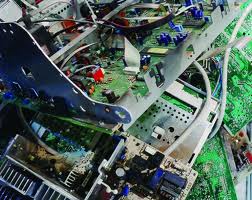Markets may be “in turmoil” at present but “a tremendous future” awaits plastics recycling, Surendra Borad of Belgium-based Gemini Corporation NV has predicted.
The chairman of BIR’s Plastics Committee told delegates at the meeting in Dubai that plastics scrap has weathered the global economic storm better than many other commodities and better than had been feared at the time of the previous BIR Convention last October.
Plastics scrap prices have been improving – partly on the back of the stockholding capacity of traders in Europe – and much of the negative sentiment of late last year now appears to have been “an over-reaction”, he said. And the business is “booming” in some developing countries such as India where a number of new sorting plants are coming on stream.
Borad concluded his opening address with the comment: “There is plenty of business for all of us – in trade, transfer of technology and joint ventures.”
Beginning a review of country-specific market developments with India, the Committee’s Chairman noted that its proposed pre-inspection controls on recovered paper and scrap metal do not appear to extend to secondary plastics, although some customs clearance problems have occurred at the leading port of Nhava Sheva.
In the United States, prices of plastics scrap have been improving in recent weeks and container availability difficulties have eased, according to Borad. Australia too has witnessed “small” scrap price increases as well as good demand from China as compared to other Asian countries; and from New Zealand, it was reported that steady-to-strong demand has been fielded from traders in Hong Kong.
Among the market summaries presented by other BIR Plastics Committee members, Jacques Musa, Veolia Propreté France Recycling, lamented that French plastics recyclers have sustained a 50 percent drop in orders when compared to the corresponding period last year, with credit insurance companies adding to the sector’s problems by “reducing or cancelling” financial cover. The same speaker noted that Chinese buyers had made a strong return to the market in late April.
Reporting on the Dutch and German markets, Peter Daalder of Daly Plastics in the Netherlands highlighted the unpredictability of buyers in China, many of whom have been jumping from one supplier to another. He also pointed to “rocketing” overseas sales prices which had almost tripled between November 2008 and April this year, adding that the export market is now “over the top” and that a correction can be anticipated. According to Daalder, plastics recyclers in Europe are operating at only 50 percent of their capacity.
The BIR Plastics Committee’s guest speaker – Rajnish Sinha, General Manager of Horizon Technologies FZE of the United Arab Emirates – said that the Middle East is one of the world’s largest consumers of plastics and yet “is not doing nearly enough to recycle plastic”. But, he underlined, “there is definitely a way forward”: for example, a number of major corporate brands – including Coca-Cola and Marks & Spencer – are using recycled PET for a variety of packaging products.
Sinha emphasized the environmental pluses of recovering and reprocessing PET: recycling just one metric ton saves 5700kWh of electricity, 700 gallons of oil and more than 1.5 metric tons in carbon dioxide emissions, he contended.
Source: worldscrap.com








